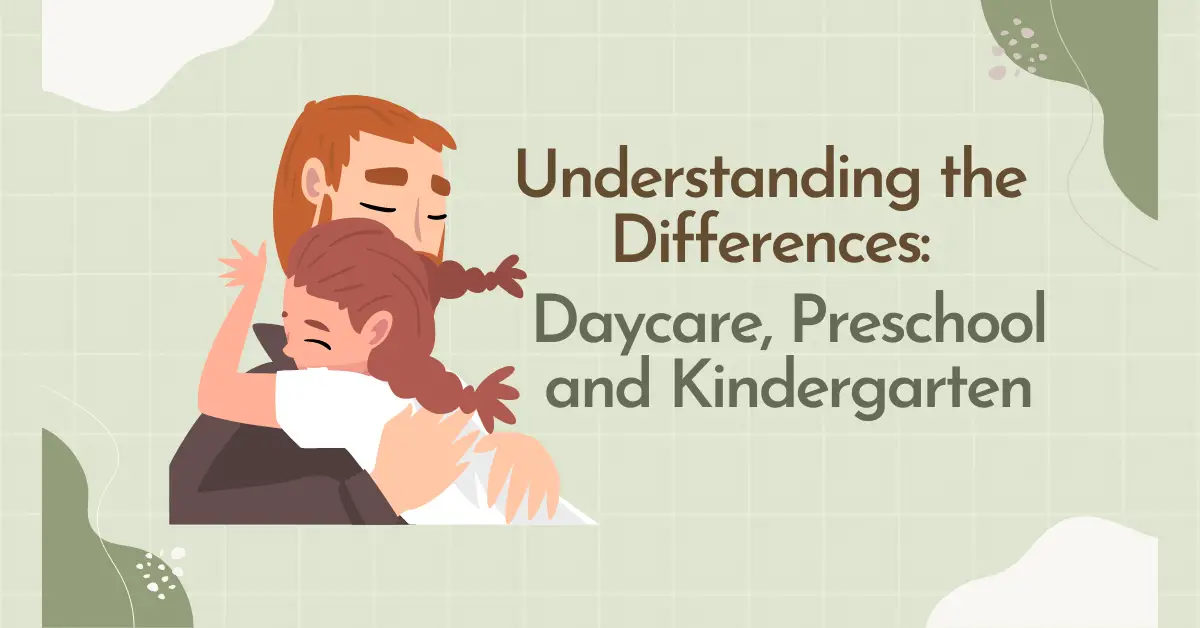Childhood education forms the foundation of a person’s life-long learning journey. Parents often come across terms like daycare, preschool, and kindergarten while exploring educational options for their children. While these terms are sometimes used interchangeably, they differ in many ways. Understanding these differences is crucial to make an informed decision about your child’s early education.
So what are the differences between daycare, preschool, and kindergarten?
Daycare, Preschool, or Kindergarten: A Fundamental Comparison
Daycare
Daycare centres are typically designed for working parents who need a safe and nurturing environment for their children during the day. These centres accept children from infancy to school age and provide meals, nap times, and various activities throughout the day. Many daycares have educational components, but their primary focus is childcare.
Preschools
Preschools, on the other hand, are more education-focused. They accept children usually between the ages of 3 and 5 and focus on preparing children for kindergarten. They provide structured learning experiences through play and other activities.
Kindergarten
Kindergarten is the first year of formal education in the school system. It accepts children typically around the age of 5, preparing them for the academic demands of grade school. The emphasis here is on structured learning, although there is still plenty of time for play and exploration.
Free baby stuff for you to claim for your baby! Sign up to get the PDF with all the links.
Choosing Between Daycare, Preschool, or Kindergarten
Choosing between daycare, preschool, and kindergarten depends on the child’s age, developmental readiness, and the family’s needs. For working parents with infants or toddlers, a daycare might be the best choice as it offers flexible care hours. Parents seeking an educational head-start for their preschool-aged children might opt for a preschool. Kindergarten, being a standard part of the education system, is typically the next step after preschool.
Daycare vs Preschool vs Kindergarten Learning Environments
Daycare
Daycare centres provide a homely environment where children learn through play and social interaction. The structure is more relaxed, and the activities are designed to cater to different age groups.
Preschool
Preschools offer a bridge between the casual environment of daycare and the structured environment of kindergarten. The learning is more organized, and activities are designed to develop cognitive and social skills.
Kindergarten
Kindergartens, being part of formal schooling, have a more structured curriculum, focusing on literacy and numeracy skills. The classroom environment is designed to prepare children for the rigours of school life.

Choosing the Best Fit: Factors to Consider
When deciding between daycare, preschool, and kindergarten, consider the following factors:
Age and Developmental Readiness
Daycares are better suited for younger children, while preschools and kindergartens cater to older, more developmentally advanced children.
Hours of Operation
Daycares usually offer more flexible hours, while preschools and kindergartens adhere to a strict schedule.
Curriculum
If early education is a priority, preschools and kindergartens, with their structured learning approach, may be a better choice.
Cost
Daycare costs vary widely, and preschools and kindergartens can be expensive. Ensure that your choice aligns with your budget.
The Benefits of Early Childhood Education
Early childhood education, encompassing daycare, preschool, and kindergarten, provides a plethora of benefits to children. This stage of education is not merely a safe place for parents to leave their children during the day; it is a vital setting for developmental and educational growth. Here are the main benefits of early childhood education:
Cognitive Development
Early childhood education programs are designed to stimulate cognitive development. Through play-based learning and structured activities, children learn essential skills like problem-solving, critical thinking, and creativity. These programs often introduce basic numeracy and literacy, fostering early academic success.
Social and Emotional Development
Early education settings offer children an opportunity to interact with their peers, fostering social skills and emotional intelligence. They learn to share, cooperate, take turns, and navigate conflicts. They also begin to understand their own emotions and those of others, which is crucial for emotional well-being and relationship building.
Language Skills
Early childhood education is a key period for language development. Through conversations, storytelling, and songs, children enhance their vocabulary, pronunciation, and comprehension. They also develop communication skills that will be vital in their educational journey and beyond.
Structure and Routine
Preschools and kindergartens introduce children to a structured environment, helping them understand the concept of time, order, and routines. This sense of structure and routine gives children a sense of security and prepares them for the formal schooling system.
Independence and Confidence
In an early education setting, children are encouraged to do things independently, fostering self-confidence and self-esteem. They learn to trust their abilities, make decisions, and take risks, which are important aspects of personal growth.
Preparing for School
Early childhood education provides a smooth transition to formal schooling. Children familiar with the structured, social environment of a preschool or kindergarten are likely to feel more comfortable when they start school.
Lifelong Love for Learning
High-quality early childhood education can foster a lifelong love for learning. By making education fun, engaging, and relevant, these programs can shape positive attitudes towards school and learning, which can influence a child’s academic trajectory and future career.
Investing in early childhood education has far-reaching effects. Not only does it provide immediate benefits for children and families, but it also plays a critical role in shaping a child’s future, contributing to their academic success, personal growth, and ultimately, their contribution to society.
Conclusion: Your Child’s Needs Come First
Whether it’s daycare, preschool, or kindergarten, the ultimate choice boils down to your child’s needs and your family’s circumstances. Each offers unique benefits and learning environments. Take the time to understand the differences, visit various centres and schools, and make the choice that best suits your child’s developmental needs and aligns with your family’s schedule and budget. The journey of education is a long one, and these early steps are crucial. Make them count!

